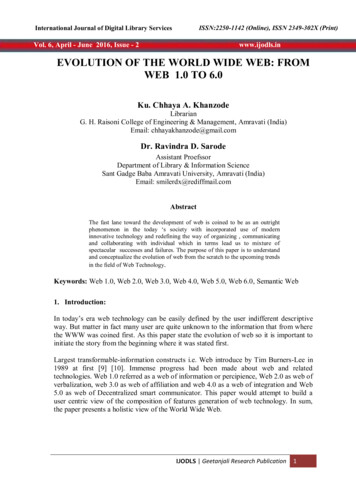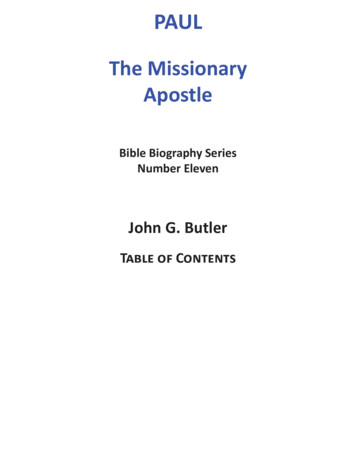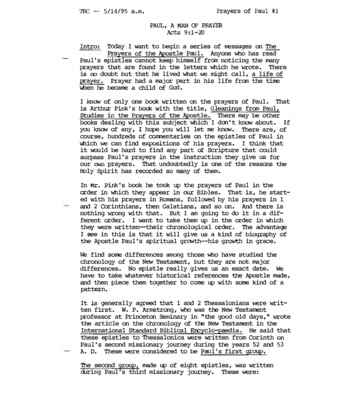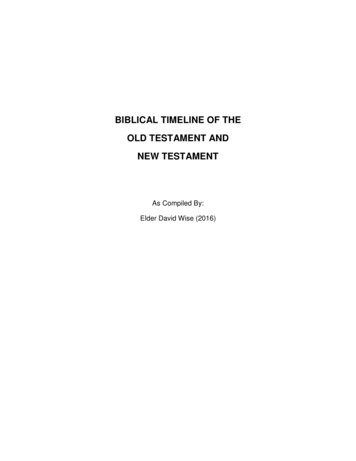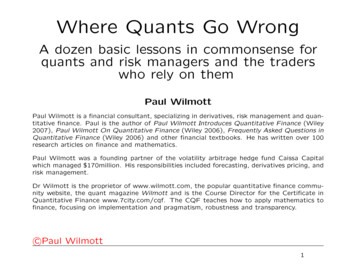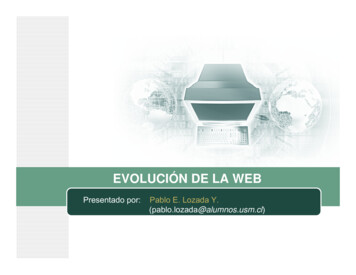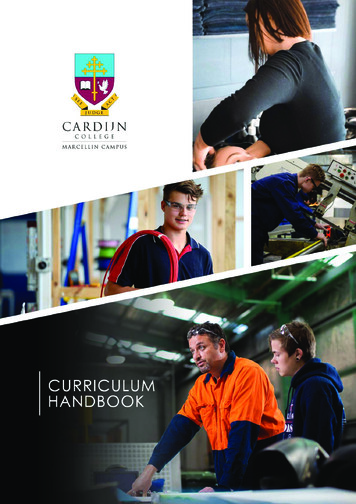
Transcription
Curriculum Handbook1
Contents1From the Principalp. 32About the Campusp. 43The SACEp. 44The Program4.1 Overview of the Program4.2 Vocational Training4.3 Work Placements4.4 School-based Apprenticeshipsp. 5Program 1 (Head Start)EnglishMathematicsDecisions for LifePhysical EducationCommunity StudiesPersonal Learning PlanBusiness StudiesDiscovery (STEM)Immersion Activitiesp. 9Program 25.1 Overview5.2 Skills Practical5.3 Research Project5.4 English5.5 Mathematics5.6 Decisions for Life5.7 Workplace Practices5.8 Trade Principlesp. 15552Marcellin Campus6p. 20Program 36.1 Overview6.2 Community Studies6.3 Workplace Numeracy6.4 Workplace Literacy6.5 Decisions for Life6.6 Skills Practical6.7 Business Management: Entrepreneurship7p. 24QualificationsAutomotive Servicing TechnologyConstruction PathwaysElectrotechnology (Career Start)EngineeringRetail CosmeticsSalon AssistantEarly Childhood Education and CareIndividual Support8Frequently Asked Questionsp. 33
From the PrincipalOn behalf of the staff of Marcellin Campus, Iwould like to officially welcome new studentsand their families to our community.These are exciting times for us as the MarcellinCampus continues to strengthen its uniqueeducation and training model.We remain resolute in: Promoting pride and fostering excellencein the teaching, learning and acquisition oftrade/ technical skillsEnsuring that Vocational Education andTraining (VET), including commencing aSchool-based Apprenticeship/ Traineeship(SBAT), is a valued and well-recognisedpathway choice available to young people.Marcellin is proud of its highly specialisededucation and training program and the fact itcaters for students who wish to complete theSouth Australian Certificate of Education (SACE)alongside a trade/vocational training pathway.Marcellin students are unique in that theygraduate with dual qualifications; their SACE,Certificate II or completion towards Certificate lllin their chosen trade/vocational pathway.As a Catholic diocesan school belonging to theArchdiocese of Adelaide, Marcellin prides itselfon Catholic values inspired through the Maristcharism. Marcellin endeavours to empowerand motivate young people to develop to theirfull potential and use their individual gifts withconfidence, sense of self management andresponsible service.We set an adult working culture at the Campuswhile, at the same time, nurturing the studentsthrough the completion of their secondaryschool studies. An emphasis will be placedon developing positive attitudes to work andtraining and continuing to develop an aptitudeto study. It is important to also recognise thata contribution to the wider community is animportant aspect of a student’s learning atMarcellin.We look forward to working with each of youthroughout the duration of your time at theMarcellin Campus.Best wishesDr Paul RijkenPrincipalCurriculum Handbook3
About the CampusMarcellin is a coeducational senior secondarytechnical campus providing a unique anddynamic educational experience, enablingstudents to study the South AustralianCertificate of Education (SACE), alongside aVocational Education and Training programdesigned to deliver workplace specific skills andknowledge.The learning opportunities at Marcellin, whetherthey be on campus or off, provide the skills andpractical experience needed for a successfultransition into an Australian School-basedApprenticeship / Traineeship (ASbA/SbAT).At the heart of our programs is our desire to assiststudents in becoming work ready. As a result, ourSACE courses are designed to complement a student’svocational training, linking classroom learning withpractical skills and knowledge.This enables students to finish their schooling withdual qualifications- their SACE, an internationallyrespected senior secondary education qualification;and Vocational Qualifications that are nationallyrecognised. Together these two qualifications equipstudents with the knowledge, skills and capabilitiesthey need to progress to further learning and work asconfident and responsible global citizens.SACEThe SACE comprises two stages which havebeen shaped into a holistic and dynamiclearning experience at Marcellin that can beundertaken over three years. To achieve theSACE a student must gain 200 credits.Each subject or course successfully completedearns ‘credits’ towards the SACE. Studentsreceive a final grade from A to E for each Stage1 subject and from A to E– for each Stage 2subject. The compulsory subjects make up 50credits: 4Personal Learning Plan - 10 creditsEnglish (Marketing Me and Trade Unit) literacy requirement - 20 creditsMathematics (Essential Mathematics A) numeracy requirement - 10 creditsResearch Project - 10 creditsMarcellin CampusStudents also need to successfully complete 60 creditsof Stage 2 subjects: Community Studies - 20 creditsTrade Principles (Integrated Learning) - 20 creditsWorkplace Practices - 20 creditsThe remaining credits are gained through: VET TrainingDecisions for Life (Integrated Leaning)Workplace LiteracyWorkplace NumeracyCommunications (Essential English)TEAM (Essential Mathematics)
The Program4.1 Overview of the programEach of the SACE subjects that students engagewith at Marcellin are designed to promoteemployability skills and to gain workplaceknowledge.Students develop key skills in literacy andnumeracy, critical and creative thinking,collaboration, communication, flexibility,accessing and synthesizing information, selfmanagement, the ability to plan, organise andprioritise work and technical knowledge relatedto their vocational field.Students participate in vocational trade trainingand work placements that directly providethem with occupational skills. These VETqualifications provide an excellent basis fromwhich to enter the workforce, but they alsoprovide students with a base from which theycan progress to higher-level qualifications oncethey begin their apprenticeship.Curriculum Handbook5
4.2 Vocational Training6Vocational Education and Training (VET)forms an integral part of the Australianeducation system and is designed to deliverworkplace specific skills and knowledge basedcompetencies.The importance of the VET system is highlightedby the fact that more than 1.2 million workersare represented in the technical and tradesector, which represents more than 13% of theentire Australian workforce.VET is a sophisticated system governed byinterconnected government and independentbodies functioning within a strict National SkillsFramework of qualifications defined by industrytraining packages and explicit quality deliverystandards- the VET Quality Framework. Yourvocational training is informed by industry andfocused on delivering flexible, relevant andresponsive education and training.The 2014-15 study by the AustralianGovernment Department for Employment intothe labour market for apprentices supports theapproach taken by Marcellin in the developmentof young people highlighting what employersare seeking in an apprentice:Our competency based training programs arecomprised of competency standards set byindustry and each student is assessed againstthose standards to ensure all required outcomeshave been achieved.Progression through the competency basedtraining programs is determined by thestudent demonstrating that they have met thecompetency standards through the trainingprogram and related work, not by time spent intraining.Marcellin Campus
4.3 Work Placements4.4 School-based ApprenticeshipsEach year students spend time off campusdeveloping their employability skills- suchas communication, teamwork, problemsolving, initiative and enterprise, planning andorganisation, self-management and their tradecraft in work placements in industry.A School-based Apprenticeship or Traineeship(SbAT) means that students still attend schoolwhile working and studying as an apprentice ortrainee.While working towards an Australian Schoolbased Apprenticeship it is important thatstudents develop their awareness about theworld of work and their place in it. As a result wehighly value experiences out in the real world aspart of the learning journey of each student.Work placements provide a chance to add tothe knowledge developed while at school andin training, gain insight into an occupation andindustry, develop professional and personalskills, and set students apart from other jobcandidates.Undertaking work placements providesstudents with both personal insight and acompetitive edge. Additionally they allowstudents to:Supercharge their resumeResumes stand out if they can demonstrateexperience in the professional workplace.Therefore undertaking work placements meansthat students can include examples of industryexperience and knowledge in their resumes.NetworkWork placement is also an opportunityto network and build business contacts.Through meeting people in the workplace andundertaking activities on placement studentsdevelop industry knowledge, contacts, andawareness of any opportunities that arise.As a School-based Apprentice or trainee,students have an employer who will employand train them on the job. Students undertakeoff-job training with a Registered TrainingOrganisation. Enrolling in a School-basedApprenticeship or Traineeship has a number ofbenefits including: training will contribute towards the SACEstart a chosen career or trade while still atschoolearn money while learninggain experience in the trade or vocation ofchoiceschool-based training will convert to fulltime or part-time post school.attend school part of the week, go to workon some days and attend a training provideron others.Apprenticeship training undertaken by astudent will be deemed an SbAT when all of thefollowing apply: the student is enrolled in the SACEthe College acknowledges and endorsesthe Training Plan required by the TrainingContractthe SbAT is recognised in the SACE.Curriculum Handbook7
Under these arrangements, students are bothfull-time students and part-time employees.The Principal (or delegate) of Marcellin willacknowledge and endorse an SbAT by being asignatory to the Training Plan attached to theTraining Contract. This signifies that the SbAT isan integral part of the student’s College programthat requires the following: The College timetable for the student willbe programmed to facilitate the studentattending work and/or trainingThe student will exchange a number ofSACE subjects for the nominal hours of VETcompetencies studied as part of the TrainingContractThe College will submit the student’s VETresults related to the Training Contract thatwill contribute to their SACE completionThe College develops specific SACE unitsto assist in further VET or work placementhours recognitionThe College supports the student throughcounselling, mentoring, support; andThe College ensures the SbAT is built intothe student’s learning pathways plan.Who are the signatories to a TrainingContract and training plan?An Australian Apprenticeship Centre (AAC) andMarcellin’s Industry Consultant will assist withthe completion and signing of the TrainingContract and Training Plan. The employer,student and parent/guardian are all signatoriesto the Training Contract (if a student is under 18years of age). The chosen Registered TrainingOrganisation (RTO) and the AAC are alsonominated on the Training Contract.Does the Training Contract end when Year 12is completed?The Training Contract for the SbAT does notnaturally expire when general education iscompleted. It expires only when the gazettedhours for the full qualification have beencompleted for both on-job and off-job training.However, options could include: 8Marcellin CampusAn early sign-off of competencyachievementCompletion using similar part-time hoursA variation of the Training Contract to aminimum 15 hours for part-timeIn most cases, a variation to a full-timeemployment arrangement for the remainderof the apprenticeship.
Program 1Mid YearOur Head Start Program (Program 1)provides our students with a ‘head start’in completing their SACE through givingthem the opportunity to engage in a threeyear SACE program, while preparing themto enter a specialist trade/vocationalprogram and Australian School-basedApprenticeship/Traineeship (ASbA/SbAT). EnglishMathematicsDecisions for LifePhysical EducationCommunity StudiesPersonal Learning PlanBusiness StudiesDiscovery (STEM)Immersion ActivitiesThe key objective in the Mid-Year program isto ensure that students develop key skills inliteracy and numeracy, critical and creativethinking, collaboration, communication,flexibility, accessing and synthesizinginformation, self-management, the ability toplan, organise and prioritise work.In addition the program exposes students toexperiences and opportunities which developtheir technical knowledge and work ready skills.Curriculum Handbook9
EnglishOur English Communication course, focuses on preparing our students by enhancing their skills toeffectively communicate in the workplace. The course is designed to increase a student’s written and oralcommunication skills with the aim of developing their ability to speak with employers and customers.Students will engage in job related scenarios which require team work, critical thinking and positiveengagement with others in order to expand their employability skills.The course engages students in: Conducting a cold call Appropriate communication in the workplace Understanding WHS documents in the workplace Active listening and non-verbal communication Writing instructional and transactional text Creating a business websiteMathematicsEmployers are seeking apprentices that are critical thinkers, who have the ability to problem solve andfind alternative solutions to problems. This course is built around the consideration that our studentswill need the skills to measure materials, calculate the costs of products required for jobs and work withmoney. Students engage in developing their number skills, measurement, problem solving and theirability to produce and understand spatial and graphical information.Our course enables students to: Use measurements for design such as area, mass, and capacity to compare or measure materials andspaces Think critically to diagnose problems and identify possible solutions Identify and use familiar everyday numbers, units of money and time to make decisions relative to atrade Problem solve using number operations with decimals, fractions and percentages Perform trigonometry and Pythagorean calculations in order to solve trade based scenarios Develop tables and graphs to portray information10 Marcellin Campus
Decisions for LifeThe Decisions for Life course provides students with the opportunity to engage in meaningfuland significant learning that is applicable to their lives. Students explore the teachings of SaintMarcellin Champagnat in generating an understanding of the five Marist characteristics of; Presence,Simplicity, Family Spirit, Love of Work and In the Way of Mary. The course enables students to exploreissues relevant to youth and allows them a chance to participate in discussions on contextualisedscenarios. The Decisions for Life program supports students in developing their awareness and abilityto make informed choices that will benefit their lives.Physical EducationOur Physical Education course promotesnot only physical fitness, but also teachesour students about of the balancebetween mental health and nutritionto provide them with the foundationalunderstanding of what it means to befit for work. Physical Education aims todevelop the student’s skills and theirability to work cooperatively in a team,while encouraging leadership, maximumindividual participation and goodsportsmanship at all times. It highlightsthe importance of maintaining a healthymind, a balanced work life and regularsleeping patterns to manage the rigoursof a working day.Curriculum Handbook11
Community StudiesCommunity Studies allows students anopportunity to build their capacity to workindependently and apply their skills andknowledge in practical ways. The program catersfor diverse learning needs and allows studentsto direct their own learning. Students research,plan, organise and complete a practical basedactivity within the school or local community.The students decide the focus of theircommunity activity and are influential in drivingtheir owning learning throughout the program.Student complete goal orientated tasks thatare negotiated through a contract of workcompleted in the initial stages.Personal Learning PlanThe Personal Learning Plan (PLP) is acompulsory 10-credit SACE subject which isdesigned to support students to plan theirpersonal and learning goals for the future, aswell as make informed decisions about theireducation and training. Students focus ondeveloping a new skill relevant to their goalsand their future trade pathway. The courseallows students time to plan, consider anddevelop an understanding of themselves and12 Marcellin Campusthe way they learn, as well as time to criticallyengage in planning for their future through settingsimple yet achievable goals.The course is focused around developing anunderstanding of the seven capabilities of literary,numeracy, information and communicationtechnology, critical and creative thinking, personaland social, ethical and intercultural understanding.
Business StudiesThrough Business Studies students areprovided the opportunity to exploresuccessful business management. Ourstudents will enhance their knowledgeof business operations, develop financialunderstanding and participate inplanning, developing and operatingtheir own school- based business.Students assess the financial viability ofestablishing a small scale business andconsider the service they are offering inrelation to the chosen target market. Thiscourse introduces students to businesscompliance, legislation and structure todevelop an understanding of the dailyoperations of the companies that mayengage them.Discovery (STEM)This integrated STEM program has a focus on students demonstrating skills in communication, planningand organising, problem solving, using technology, self-management, initiative and enterprise, thecapacity to learn independently and the ability to work effectively in a team.Program elements include;Sustainability HousingThe biggest challenge in the construction industry is sustainability. With the advent of new materialsand methods of construction and fixing our houses, this unit develops student understanding of buildingdesign and appropriate materials. Students engage in models to determine the best constructionmethods and materials.Electronics and Arduino MicroprocessorsStudents develop skills in selecting electronics components, soldering a printed circuit board assemblyto make practical projects such as Mini Boom Box to plug into their phones. Students also use amicroprocessor to create and code circuits that control a robot arm.In developing these control systems students also use advanced manufacturing technology such as 3Dprinters laser cutters, CNC lathes and CNC milling machines to realise their product designs.CO2 Powered DragstersStudents work collaboratively to develop teamwork, project management and communication skillsin realising a CO2 powered dragster. Principles of drag and friction are explored with a major focuson product realisation using advanced manufacturing principles. Students present their design,manufacturing and engineering rationale as well as test the speed of their produced vehicle.Curriculum Handbook13
ImmersionActivitiesOur immersion program providesstudents with the foundational skillsrequired in a variety of trade areas.Students will gain experience in usinghand and power tools to furthertheir ability to problem solve andcritically think in order to completepractical based tasks. Students workin collaboration with their peers todevelop their ability to work in a teamenvironment in preparing them forthe work force.14 Marcellin Campus
YEAR 2 Program5.1 OverviewIn addition to the trainingqualification that students engagewith, they undertake a program ofstudy comprised of the followingsubjects: Skills Practical Research Project English Mathematics Decisions for Life Workplace Practices Trade PrinciplesCurriculum Handbook15
5.2 Skills Practical5.3 Research ProjectDuration of Course2 semestersSACEStage 2 Research ProjectA compulsory subject of the SACESubject DescriptionMarcellin Campus prides itself on providing ahands on experience for our students. The SkillsPractical sessions form a vital part of the learningprogram. Skills practical allows our students theopportunity to immerse themselves in a varietyof practical learning environments. Studentsrotate through a variety of sessions to promotean advancement of skills that can be transferredto their chosen industry.AssessmentStudents will be assessed on their capabilityto achieve the practical elements of eachsession. Their planning, work ethic and practicalapplication will contribute to supporting theircompetency in the subject.School AssessmentPractical ApplicationPerformance100%Duration of Course1 semester (10 credits)Subject DescriptionStudents choose a research question based onan area of interest. They learn and apply researchprocesses, knowledge and skills specific to theirresearch topic, record their research and evaluatewhat they have learnt. They choose one or morecapabilities, explore the concept of the capabilityor capabilities and how it/they can be developed inthe context of their research.The term ‘research’ is used broadly and mayinclude practical or technical investigations, formalresearch or exploratory inquiries.Students are expected to: Formulate and refine a question that helpsfocus their researchGenerate ideas to plan and develop theirresearchConsider the relevance of a chosencapability (literacy, numeracy, ICT, critical &creative thinking, personal & social, ethicalunderstanding & intercultural understanding) totheir researchAnalyse information and explore ideas todevelop their researchDevelop and apply specific knowledge and skillsProduce a research outcomeEvaluate their researchAssessmentThe following assessment types enable students todemonstrate their learning:School AssessmentAssessment Type 1: Folio30%Assessment Type 2: Research Outcome40%External AssessmentAssessment Type 3: Review16 Marcellin Campus30%
5.4 EnglishSACEStage 1 Essential EnglishDuration of Course2 semesters (20 credits)Subject DescriptionIn this course literacy skills are developedthrough a focus on comprehending andcreating written, spoken, visual, and digitaltexts and using and modifying language fordifferent purposes in a range of social andcultural contexts including study, work andcommunity life. The course develops anawareness of the sociocultural aspects oflanguage in social, community, workplaceand/or imagined contexts.Students understand and interpretinformation, ideas and perspectives in textsand consider ways in which language choicesare used to create meaning. Additionally,they identify and express their ownopinions, information, ideas and responsesby interacting with a range of texts andsituations.Students work in two domains in English: Responding to textsCreating textsThe English course at Marcellin is brokendown into two semesters.Semester 1 – Marketing MeThis course provides students with the skills,tools and opportunity to develop their writtenand oral skills which will in turn improve theirchances of gaining an apprenticeship.Semester 2 – Trade UnitStudents read, listen, speak, respond to andcompose texts using language to establishand maintain effective communications andinteractions with people in different workingcontexts.The English course consists of the followingeight topics:Topic 1: ResumesTopic 2: Application LettersTopic 3: Job InterviewsTopic 4: Job Advertisement AnalysisTopic 5: Job Quotes and ProposalsTopic 6: Trade Based PostersTopic 7: Letter Writing and Responding toBusiness ComplaintsTopic 8: Website AnalysisAssessmentThe following assessment types enable studentsto demonstrate their learning:School Assessment100%Assessment Type 1: Responding to TextsAssessment Type 2: Creating TextsCurriculum Handbook17
5.5 Mathematics5.6 Decisions for LifeSACEStage 1 Essential MathematicsSACEStage 1 Integrated LearningDuration of Course2 semesters (20 credits)Duration of Course2 semesters (10 credits)Subject DescriptionThis course offer our students the opportunityto extend their mathematical skills in what theyapply to practical problem-solving in an everydaycontext. Student apply their mathematicalknowledge to a diverse range of settings,including everyday calculations, financialmanagement, measurement, graphing, geometryand statistics.Subject DescriptionThis is a contextualised course designedspecifically for students transitioning intoworking life and adulthood. The program isdesigned to provide students with the skills andabilities to make positive decisions in life whenfaced with tough situations. It provides educationabout some of the pressures and temptationsthey may experience as a young adult growingup. Students will look into issues such as drugs,sex education, workplace ethics, depression andanxiety, conflict resolution and cyber safety.The program has an emphasis on developing thestudent’s computational skills and expandingtheir ability to apply their mathematical skills toa variety of contexts.Topic 1: Calculations, algorithms and ratiosTopic 2: Earning and SpendingTopic 3: GeometryTopic 4: Data in ContextTopic 5: MeasurementTopic 6: InvestingTopic 7: Open TopicAssessmentThe following assessment types enable studentsto demonstrate their learning:School AssessmentAssessment Type 1:Skills and Application TasksAssessment Type 2: Folio18 Marcellin Campus100%AssessmentThe following assessment types enable studentsto demonstrate their learning:School AssessmentAssessment Type 1: Practical InquiryAssessment Type 2: ConnectionsAssessment Type 3: Personal Endeavour100%
5.7 Workplace Practices5.8 Trade PrinciplesSACEStage 2 Workplace PracticesSACEStage 2 Integrated LearningDuration of Course2 semesters (20 credits)Duration of Course2 semesters (20 credits)Subject DescriptionIn Workplace Practices students developknowledge, skills and understanding of thenature, type and structure of the workplace.Subject DescriptionThe course teaches basic trade principles witha focus on design, mathematics, engineeringscience and the development of employabilityskills. The trade principles taught are applied tosimulated, on-the-job situations so that studentslearn to practise collaborative processes inteams. It aims to prepare students for the worldof work.They learn about the relationships betweenwork-related issues and practices, the changingnature of work, industrial relations influencesand workplace issues that may be local, nationalor global or industry specific.Students also undertake learning in theworkplace and reflect on and evaluate theirexperiences in relation to their capabilities,interests and aspirations.Evidence of LearningStudents provide evidence of their learningthrough nine assessments, including the externalassessment component.Students undertake: Three assessments for the folioTwo assessments for the performance ineither work experience or VET TrainingTwo assessments for the reflection, andOne investigationEmployability skillsIndustrial relationsChanging nature of workSchool-based Assessment70%Assessment Type 1: FolioThe negotiated task allows students to explorean area of interest from their chosen industry indepth, while developing skills to prepare themfor further training and work.AssessmentThe following assessment types enable studentsto demonstrate their learning :School-based Assessment70%Assessment Type 2: ConnectionsAssessment Type 3: ReflectionAssessment Type 4: InvestigationThe course provides opportunities for studentsto use appropriate and effective language ina workplace context. It supports students toengage effectively with others and promotes thedevelopment of investigation and inquiry skills.Assessment Type 1: Practical InquiryAssessment Type 2: PerformanceExternal AssessmentStudents focus on their employability throughenhancing and reflecting on their growth of thecapabilities; Literacy, Numeracy, ICT, Critical andCreative thinking, Personal and Social, Ethicalunderstanding and Intercultural understanding.Each activity aims to challenge students in orderto promote self-reflection and learning.30%30%External AssessmentAssessment Type 3: Personal EndeavourCurriculum Handbook19
YEAR 3 Program6.1 OverviewIn addition to the trainingqualification that a student engageswith, students undertake a programof study comprised of the followingsubjects: Community Studies Workplace Numeracy Workplace Literacy Decisions for Life Skills Practical Business Management: Entrepreneurship20 Marcellin Campus
6.2 Community Studies6.3 Workplace NumeracySACEStage 2SACEStage 1 Essential MathematicsDuration of Course2 semesters (20 credits)Duration of Course1 semester (10 credits)Subject DescriptionThis course continues our inquiry basedapproach in allowing our students furtheropportunity to engage in developing theessential skills required of those in theworkforce. Students consider design in industry,they explore current and future infrastructureand work to conceptualise a design idea.Students are provided with the opportunity touse 3D computer programs such as ComputerAided Design (CAD) or sketch to complete theirdesigns. The course allows students to plan,organise, propose, cost, develop and reflecton their chosen design and space. The skillsacquired from the course can be transferredinto multiple areas of their lives. Studentsevidence their learning and reflection on theirdevelopment throughout the course.Subject DescriptionIn this course workplace numeracy skills aredeveloped further, knowing th
the completion and signing of the Training Contract and Training Plan. The employer, student and parent/guardian are all signatories to the Training Contract (if a student is under 18 years of age). The chosen Registered Training Organisation (RTO) and the AAC are also nominated on the Training Contract. Does the Training Contract end when Year 12




